Interview: Pro-life Democrats reflect on the Democratic Party and the pro-life movement
1. How would you describe your position on abortion? How long have you held that position and how did you arrive at it?
Jenna: I was raised pro-life, but it was seeing the Lennart Nilssen Nova special in fourth grade that I really, incontrovertibly became pro-life for my own reasons. I even found myself thinking that the abortion debate was over now—the humanity of the human embryo and fetus was right there, in front of our eyes.
Kristin: I am anti-abortion and view it as no different than killing anyone else. I have felt that way since I first heard what it was back when I was 14. It was an instantaneous repulsion. I heard that it was the termination of a pregnancy, knew from my middle school biology classes that that would mean killing another living human being, and was immediately against it and horrified that it was a thing to begin with. As an energetic feminist I instantly saw it as the exploitation of women, assumed that conservative deadbeat dads must be behind it, as there was no way that hoards of women were up and making the decisions to kill their children. I used to get anxiety attacks about it and had a lot of survivor’s guilt given that I made it out of my mother’s uterus alive whereas so many were killed.
Paula: I believe in the sanctity and worthiness of all life from conception to natural death. I was raised Catholic, but I also base my beliefs on science. Genetics fascinate me and the uniqueness and worthiness of each conceived human being is very real to me. I have always been pro-life, even as a child.
Theresa: I’m unwaveringly against abortion, regardless of reason for seeking one. And I’ve been against it since the moment I was aware of its reality, which was probably in middle school or early high school. Back then, it began as a matter of having been formed by Catholic Church teaching within my parish community and at home from my parents: that human life has inherent and non-refutable value and the willful and intentional destruction of human life is absolutely not acceptable, especially within the womb.
I grew up Jewish in the rural South (the “buckle of the Bible Belt”), which imparted on me “outsider status”—an identity that I embraced. My congressional district was (and is) super-majority Republican. This along with my parents’ influence (who had come from elsewhere) led me to gravitate to more liberal politics—which, of course, included a reliably pro-choice position on abortion. I recall laughing at my pro-life 8th Grade health teacher (male—also a football coach) when he told our class that abortion was performed with “scissors” and that “sometimes the baby comes out crying.”
2. How would you describe your political position with respect to American politics (e.g. liberal, moderate, conservative, Republican, Democrat, etc.)? How long have you held that position and how did you arrive at it?
Jenna: I’m pretty far left and consider myself a Democratic Socialist. I first started leaning left when I struck out on my own at 18, and came face to face with low wages and a lack of healthcare resources. As income inequality widens and our health care system erodes further, I move farther left.
Kristin: Generally I just say that I am everything on the left. I have often called myself a hippie, even as a kid. I have been anti-war since I was young and have always hated violence and supported equal rights for all. I was about 13 when I first started to understand Democrat vs. Republican and started to say I was a Democrat, and then liberal vs. conservative and used “liberal” more often. I came out as atheist right before that. I agree with general left-wingers, though my main ideals are more anarcho communist in nature. When I found out what communism was in my high school history class, which was basically described as a society that is governmentless, moneyless, and classless, where people come together to take what they need and only what they need so that there is enough to go around for everyone, I had a eureka moment of “That sounds like a utopia!” and knew that even if that is hard to attain, that is what I think the goal of humanity should be. I have often thought of it as weird to say that, given that all humans are for all intents and purposes created equal, one human or a group of humans should rule over all others when we are essentially all peers. Still, I understand that moving the status quo is better than doing nothing at all so I agree with pushing Democratic and Socialist policies such as raising the minimum wage or supporting universal healthcare in the meantime, but I would like to see an end to Capitalism.
Travis: I have stereotypical liberal positions on most issues with the exception of abortion and religious freedom issues. On economic issues, I am more liberal because I find American capitalism is morally corrupt.
Theresa: I am more liberal leaning nowadays. Ultimately the issues are more important to me than partisanship. Human dignity, rights, and life transcend partisanship. I was once registered as a Republican because I voted with the idea that abortion was the most important issue. It remains a grave issue to me, but I left the Republican Party as of 2016, completely appalled at the nomination of Donald Trump, a man so vile and repulsive in his words and in his treatment of anyone who will not feed his ego. I knew that it was not possible for me to both oppose abortion and support a man who was clearly not consistently pro-life, if he was even pro-life to begin with.
Abortion has always been a grave evil to me, but I’ve since come to understand that human life is not a single issue phenomenon, and abortion cannot be the only important issue to focus on. Babies aren’t born in vacuums and choices, especially the decision to abort, aren’t made in a vacuum either. Every life issue that impacts you or me or others impacts the unborn too. If an expecting mother is facing a crisis, that crisis will affect her child, too—often and unfortunately in the form of abortion. So if I care about unborn children, I really ought to care about all issues that affect their mothers and families. Whether it is the environment, healthcare, childcare, a living wage, parental leave. Whether it is racism, misogyny, ableism, and any forms of bigotry. Valuing the rights of the unborn begins before conception, with ensuring that society supports the needs of women so that they are capable of bringing a child into the world freely, without distress. And every child deserves to be born into a loving and well-supported family.
I didn’t come to this more comprehensive position right away: it’s been an ongoing progression from my Catholic liberal arts college through today (I’m now in my thirties). It was a college Sociology course that started my personal growth, but it was also listening to various arguments from both pro-life and pro-choice people over the years. I came to understand that life isn’t so simple, and that my experiences are not the same as others’. Listening to understand has helped me empathize with people who are struggling in ways I never did.
Benjamin: I am probably what would be called a “moderate” Democrat. I take issue with the direction that the party seems to be going. I know that I am getting more fiscally conservative as I get older—this has coincided with a rising income, so perhaps I am blinded by my own self-interests. I admire the passion of the younger Democratic activists but I believe that too much of what the party is pushing now is exclusionary. There appears to be a purity test on almost every issue, as well as a hyper-focus on social issues (like race/gender) that I believe is short-sighted, not to mention a mistaken electoral strategy. (I refer the reader to the recent election results in the United Kingdom.)
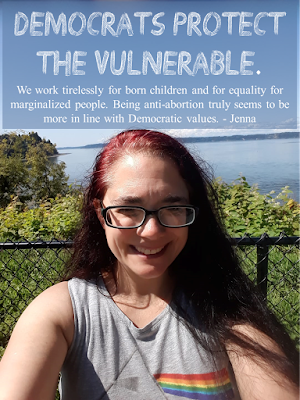 |
| Click to enlarge. |
3. How do you see the anti-abortion position fitting in with other Democratic values?
Jenna: Democrats protect the vulnerable in society. We work tirelessly for born children, and for equality for marginalized people. Being anti-abortion truly seems to be more in line with Democratic values than with the values of a party that does so little to help people thrive.
Kristin: I view it as the same as my other left-wing beliefs: it’s all about supporting the most innocent, vulnerable, poor, downtrodden, voiceless, helpless, and defenseless. There is no group that fits these words more than the pre-born, other than non-human-animals. So I see being pro-life as just about the most liberal thing there is. It fits in with my stances of being a vegan and feminist, anti-war, not anti-death penalty, anti-police brutality, and supporting the rights of all who are disenfranchised. I’m against the violence and oppression of anyone.
Travis: The Democratic Party supports more pro-life positions than the Republicans, with abortion being the main exception. The positions of Democrats on the death penalty, LGBT rights, immigration, and gun control tend to more closely align with a consistent life ethic than Republicans’ positions. Also, Democrats don’t support an unapologetic racist and sexual predator for president.
Theresa: As a whole the Democrat Party fights for civil rights for most human beings. Unfortunately, they fail entirely when it concerns unborn human beings. Without a doubt, the Democrat Party establishment firmly supports abortion. But I also acknowledge their position regarding a living wage; their support for LGBTQIA people, people of color, and the disabled; their position regarding affordable healthcare; their call to employers to provide parental leave for new parents, their opposition to discrimination against religious minorities, and their advocacy for the environment. These are all issues that matter when it comes to deciding whether to have a child—whether to get pregnant in the first place, or if already pregnant, whether to carry the baby to term.
Benjamin: I’m not sure. I believe that the party has become so doctrinaire on the abortion position that its “values” have become muddled. I like to say that Democrats have the moral advantage when it comes to guns and the environment; Republicans have the moral advantage regarding the abortion issue.
4. Regarding abortion, the Democratic Party platform says in part:
We believe unequivocally, like the majority of Americans, that every woman should have access to quality reproductive health care services, including safe and legal abortion—regardless of where she lives, how much money she makes, or how she is insured. We believe that reproductive health is core to women’s, men’s, and young people’s health and wellbeing. We will continue to stand up to Republican efforts to defund Planned Parenthood health centers, which provide critical health services to millions of people. We will continue to oppose—and seek to overturn—federal and state laws and policies that impede a woman’s access to abortion, including by repealing the Hyde Amendment.
What are your thoughts on this stance?
Jenna: I disagree, and especially with the idea of revoking the Hyde Amendment. Hyde, along with gestational limits, have long allowed pro-life Democrats to have an uneasy truce with the pro-choice plank of the party.
Kristin: That is an inherently oppressive stance because they conveniently leave out that abortion kills distinct living human beings. We know way too much about science to ignore that elephant in the room. And I view it as inherently manipulative toward women to try to convince us that the deaths of our children equals healthcare and our rights to our own bodies, choices, and lives. An abortion is considered botched if it doesn’t end someone else’s life and destroy their body. I love the quotes “Abortion is the ultimate exploitation of women” and “Abortion is a tool of the patriarchy.” Ignoring what abortion is and trying to get us to support it with all this other talk about access and healthcare is exploitative.
Travis: I don’t have a problem with funding Planned Parenthood, since they do other things besides abortion and the federal funds they receive cannot go to abortion. I do wonder what was wrong with the “safe, legal and rare” wording the Democratic platform used to have. The current wording and many politicians seem to celebrate abortion, rather than looking at it as a tragedy. I understand that Democrats feel the need to not stigmatize women who have had an abortion, which I respect. The onus of abortion is heaped on women, while the father escapes relatively unscathed. But taking a life or pretending that something with different DNA and a heartbeat isn’t a life doesn’t comport with Democrats’ other values. At least the word “rare” respected the value Democrats place on life and made the platform less revolting to people who vote solely on the abortion issue.
Paula: I support the Hyde Amendment. I was so disappointed in Joe Biden for caving into pressure regarding his support of the Hyde Amendment. I don’t want my tax dollars to be spent on abortion (or war or the death penalty or ICE). The Hyde Amendment seems like a good compromise on an issue that is so divisive. I am also very disappointed that abortion has become a litmus test for Democrats, and I don’t feel welcome in the party. I have FB friends who have blocked me over abortion. It saddens me that we can’t find some areas of agreement or compromise.
Theresa: I believe everyone should have access to affordable healthcare, but abortion is not healthcare in the first place. The medical profession has a grave duty to first do no harm. And abortion, as opposed to miscarriages or ectopic pregnancies, is the deliberate destruction of the developing human embryo or fetus. Intentional destruction of life is something I will always oppose. By all means, if women need contraception or any other means to prevent—not terminate—a pregnancy, prevention would be far more preferable to ending a life. Punish rapists and end rape culture instead of arguing that abortion is a necessity in cases of rape. Insisting that babies conceived in rape should be aborted does absolutely nothing to stop rapists. How many abusers take their victims to have abortions, only to continue with the abuse? End rape culture.
5. Have you interacted much with Democratic activists or politicians? If so, how has that gone? If not, why not?
Jenna: Yes, some. It’s gone well, but I have mostly interacted on conservation issues rather than abortion issues.
Kristin: Not much yet. I would like to though, to see if I can get anywhere with getting them to understand the viewpoint of those who are pro-life, and how [the Democratic Party is] screwing themselves over by rejecting pro-lifers. I have Facebook commented to local Democratic politicians before and one seemed civil at first but then blocked me after I started talking about science.
Travis: I have had little involvement with Democratic activists and politics because my children take up most of my free time.
Paula: Not personally, although I do keep informed. I write letters and send emails occasionally.
Theresa: I have only minimally interacted with my Democrat representatives in Congress, particularly regarding the issue of gun violence. I merely expressed my concerns to my Congressman and he responded by acknowledging that he shares my concerns and has voted in support for certain restrictions. Of course, this remains an ongoing battle so there isn’t any definitive conclusion to this issue at all.
Then there is the matter of the Women’s March in DC. I’ve wanted to participate in the Women’s March but I do not feel welcome since I do not share their support for abortion and they have made it clear that pro-life feminists aren’t welcome. But perhaps I shouldn’t think about my own personal comfort zone. If I intend to support Democrat candidates over Republican ones, I do intend to challenge them to give a greater support for life and to work towards decreasing the numbers of abortion.
Benjamin: Not really.
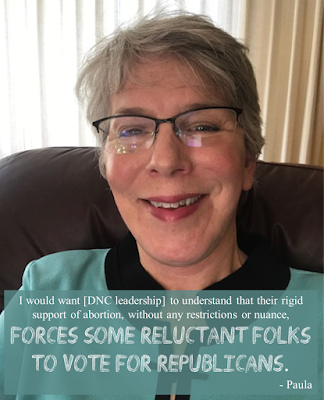 |
| Click to enlarge. |
6. If you could sit down with DNC leadership to discuss the issue of abortion, what would you want to say to them?
Jenna: I’d tell them that when she was pregnant with me, my mother was poor, mentally ill, in an abusive relationship, about to be single, and experienced complications that caused her doctors to say I would to be disabled. I’d tell them my life is worth living and that I, and people like me, can hear them when they talk about the reasons women “need” access to abortion.
Kristin: Ignoring or denying the humanity of the pre-born makes them look like a bunch of anti-science flat-earther ripoffs, so they need to actually admit that abortion causes real deaths, and that a lot of women have PTSD from abortions because of those deaths. [Party leaders] need to work with pro-lifers to hear our concerns instead of just ignoring everything and pretending that we just want to control women’s bodies. We are women and a lot of us are strong feminists. Stereotyping the pro-life movement as a bunch of old, white, christian, conservative men will get them nowhere because most of us don’t fit into that caricature, so they’re just speaking past us. That’s why the abortion debate is still fiery and has not budged in decades. And, most importantly, if they want to win against people like Trump, it is imperative that they start understanding that it is because the pro-life movement sees abortion as killing babies that so many pro-lifers are single issue voters and voted for him just because he is pro-life, whereas pro-life Democrats could win.
Travis: I would say that Democrats are politically dead on the state and federal level in the South and the Great Plains because of their abortion position. Widening the tent for people who are against abortion would be a great way to attract people uncomfortable with the racism of the Republicans.
I would also encourage them to talk about how abortions go down when they hold office. Democrats do more than Republicans to help women choose life. They should also show some respect for us. Apparently 1/3 or all Democrats are pro-life. They need us.
Theresa: Human rights begin the moment there is new human DNA. Life is the first and foremost human right and to deny it to the most vulnerable is absolutely not acceptable. Abortion takes the historical and lasting oppression of women and displaces it on helpless children. And a person isn’t valuable because he or she is wanted, but because he or she is human.
Benjamin: I would say that pro-life voters should not be ostracized. I live in New York and it’s basically a thought crime to be pro-life. There is certainly a silent plurality here, however, that consider the mainstream New York “Democratic” position on abortion to be downright barbaric. Recall Gov. Cuomo’s “celebration” of the recent New York abortion law by mandating that the Freedom Tower be lit in pink (the law itself is truly remarkable in what it allows).
Jenna: Neither major party is pro-life. But given two imperfect choices, between the party I disagree with on just the matter of abortion—which Democrats are better at reducing than Republicans—and the party I disagree with on every other subject, I’m going with the lesser evil. Denying people a living wage, family leave, universal health care, affordable daycare, and gap mending benefits drives people to think abortion is their only or best choice. I can’t be party to that, or to the many other dangers and indignities the Republicans impose on people. And I haven’t found a third party I can be totally on board with.
Kristin: Given the endless amounts of other issues that are really important to people, I can understand why someone would want to vote for a pro-choice Democrat, and I think that people who say those voters can’t be pro-life are ignoring all of these other issues. There are so many things that are super important to me besides abortion that I could never vote for a conservative. I don’t really consider bombing people in other countries to be consistent with my pro-life beliefs. The “you’re not really pro-life” mentality could easily go either way, so it’s best for people to vote with their conscience instead of what other people label them. I likewise have a hard time voting for a pro-choicer, so I have yet to vote for a person. I will vote for left-wing pro-lifers, but I don’t blame anyone for voting for pro-choice Democrats.
Travis: Neither party is pro-life; the Republican Party platform states that it’s against abortion but that doesn’t make it pro-life. As a voter, we have to determine which candidate most closely adheres to a consistent life ethic. Since most Republicans have declared fealty to Trump, they cannot argue that they are more pro-life than a Democrat.
Theresa: I disagree. I no longer vote according to one issue because a human life is not ever one issue. Life is more than being born. We all have needs, aspirations, personalities, experiences, and different perspectives. Our lives involve so many different issues from the womb until the tomb. I recognize how privileged I am, never having worried how bills would be paid, never enduring an abusive relationship, never being a victim of discrimination. I have always been free to make my choices, my dignity has always been intact, and I am content and at peace. Is it so unreasonable that I should want this dignified existence for all human beings? And if I have been so fortunate as to never have had a crisis pregnancy, I want the same for all women. At the moment only the Democratic Party supports policies that will best respect human dignity. When it concerns the quality of life for Americans, we shouldn’t fear government overreach as much as we should abhor the government’s indifference to people in need. Human life and dignity should be our highest priorities.
If anything, I cannot consider myself pro-life if I choose to turn a blind eye to all of the faults of the Republican Party and continue to vote for and support them. I firmly believe that being anti-abortion alone is not enough. Opposing abortion alone doesn’t make one pro-life if one doesn’t value needs of all after the baby has been born. There are nine months of development in the womb, and 70 or so years of life outside of the womb. To be pro-life means to defend life for the duration of those 70 years.
Benjamin: I’m torn. I see their point but I care too much about the environment to hand over the reins to the Republicans.
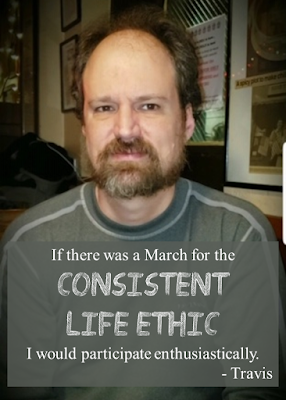 |
| Click to enlarge. |
8. Have you interacted much with the overall pro-life movement (e.g. walks, rallies, meetings, lectures, protests, political activities, sidewalk counseling, pregnancy centers, etc.)? If so, how has that gone? If not, why not?
Kristin: A little bit. I have volunteered with crisis pregnancy centers which has taught me a lot, especially that they help a ton of low-income minority families by giving free supplies. I have gone to my local March for Life a few years in a row and that taught me that the pro-choice counter-protesters have absolutely no idea who pro-lifers are as people and why we are pro-life. They just read off chants from a script, stereotyping pro-lifers as religious conservatives. I have done small things like sidewalk chalked or hidden drop cards in various places. I returned to a chalking I did to see that people had actually taken the effort to grab a bunch of handfuls of grass and dirt from the local park and smear it on the chalk so that people wouldn’t see it. I definitely want to do more and would like to start up my own local activism group.
Travis: I’m interpreting “pro-life” in this question to mean anti-abortion. I only use the term “pro-life” for people who are pro-life on all issues, not just abortion. I would never attend a rally that welcomes Trump or people like him, so I have never gone to the March for Life rally even though I live in the DC area. I am turned off by the misogyny I see underlying the anti-abortion movement. I knew one male Trump supporter who was obsessed with the idea that Hillary had an abortion but didn’t bother to ask how many Trump may have paid for. The comment sections of sites like LifeSiteNews are full of vile, hateful nonsense. I am embarrassed to admit I’m for more restrictions on abortions because I realize I’m aligning myself with male zealots who don’t respect women’s needs and autonomy when it comes to cases of rape and non-viable pregnancies.
Paula: I ran a pregnancy support and adoption agency for a Catholic Social Service agency for 10 years. We also had a program for post-abortion healing. It felt good to offer alternatives to abortion. Most of the parents we helped were able to find a way to give birth and raise their children. We helped them find the resources and support they needed to do that. Adoptions were hard, but we promoted open adoptions and the birth parents were empowered to pick the parents themselves and develop a good relationship with them. Occasionally, adoption was the only path they could take to give life.
I demonstrated in front of a PP clinic once. It was right after the undercover videos of the Planned Parenthood doctors came out. I don’t know if baby body parts were sold illegally, but I was sickened by the callous way the doctors discussed killing babies and picking out body parts, all while sipping wine and munching on salad. I needed to do something to protest and I joined a group in front of the local PP. As an aside, this was the first time I understood why some do not trust mainstream media. No one was covering this except Fox news. That was an eyeopener. I am not a fan of Fox news but it was the only place I could get information about this situation.
Theresa: When I was in high school and college, I attended the March for Life in Washington D.C with my Catholic schools. It was certainly quite the experience to be present with so many other pro-life supporters, even in the bitter cold. It has been almost 20 years since I’ve been to one of the marches. As of more recently, I interact mostly with pro-life groups online. It is often quite informative as over the years, the discussions I have had have further shaped my stance against abortion and they have convinced me more and more of the necessity for a more whole life approach.
Benjamin: Not much. I recently saw a group of people outside a church that had participated in a march for life and told them how much I admired their efforts.
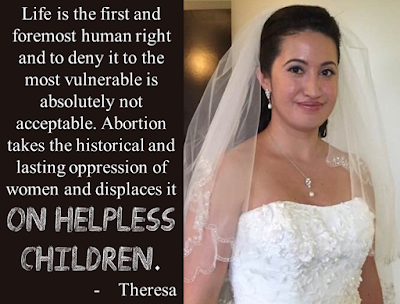 |
| Click to enlarge. |
9. How accessible is the pro-life movement for you? How could it be more accessible? What are some ways other pro-lifers could make Democrats and leftists feel welcome?
Jenna: I haven’t interacted with the PLM in real life for years, for a variety of reasons. We don’t have much of an alternative PLM here in the Seattle area, and I don’t want to be part of the conservative movement. A big part of it is the anti-LGBTQ rhetoric. It would be very hard for me to stand next to someone who shares the goal of preventing abortion, but then would deny a loving family, which might include people I love, from adopting a child. That’s certainly not the only leftist stance I find a lot of mainstream PLM activists are antagonistic to, but it’s a big one. So I’d say not tying anti-LGBTQ activism to pro-life activism. Also, not devaluing other human lives—immigrants, chronically ill people, the poor and homeless.
Kristin: Because I tend to stick to my progressive, feminist, atheist pro-life bubble, it seems hopeful and welcoming in those groups and with those people. When I venture out into the mainstream pro-life spaces, I start to remember that there are still people who argue with us that atheists have no moral grounding to be pro-life or we’re going to hell for being atheist, or pro-choicers who tell us we cannot be pro-life feminists. There is still too much religious imagery and quotes, which makes the movement seem alienating to those who are secular. You can be religious but there’s no reason to bring it to pro-life events and pages, just like you wouldn’t hold a cross while giving a homeless person a meal. Conservative pro-lifers tend to not trust left-wingers and still frame it as a “left vs. right” concept, thus ignoring us. A big step in the right direction would be if these conservatives, especially the ones who have an audience such as those who associate with Fox News, would make sure to never frame the issue in a left vs. right way but rather just “pro-life vs. pro-choice.” It would be amazing if they would take a minute of their time to mention that there are lots of left-wingers who are pro-life and perhaps even mention organizations such as Democrats for Life of America or Rehumanize International. Can you imagine what it would be like if Steven Crowder or Ben Shapiro said, “Also there are a lot of lefty feminist pro-lifers these days too. Check out the organizations New Wave Feminists and Consistent Life for more info on that”? That would be amazing. Basically, give us a platform, let us speak, and promote us like crazy. Abortion would end so quickly if that were to happen, because we can reach the people that the stereotypical pro-lifers can’t.
Travis: I would only feel comfortable with an anti-abortion movement that is consistently pro-life. I would never be a part of an anti-abortion movement that is homophobic. LifeSiteNews posts anti-LGBT stories and, from my experience, anti-abortion and anti-LGBT tend to go together. The current anti-abortion movement overlooks an unrepentant Trump’s serial adultery and sexual harassment but won’t do the same for the perceived sexual sins of the LGBT community. I cannot be a part of that hypocrisy and hatred. I do follow New Wave Feminists on Twitter and Facebook and NWF has given me hope that I can find an anti-abortion group to call home. Also, Christian activist Shane Claiborne is consistently pro-life. If there was a march for the consistent life ethic, I would participate enthusiastically.
Paula: I don’t find it accessible at all except through facebook. Facebook has allowed me to make friends who share my values. So many people who call themselves pro-life are Republicans and sadly they seem to be under the spell of Trump. It is weird to me.
Nancy Pelosi made a statement a short time back that helped me feel welcomed. She said something about some of her own family members being pro-life. I can’t find the exact quote but I heard it when she was being interviewed. I will say this: Democrats are not doing a very good job of making me feel welcomed. They come across as very extreme and rigid. Our way or the highway!
Theresa: The movement itself is accessible enough. We don’t have to go far to find pro-life groups on social media, for instance. And my parish supports local pregnancy centers. But in truth, it has become more and more alienating when there is this commonly expressed belief that you can’t be pro-life and Democrat or liberal leaning. I don’t know that I need to feel particularly welcome because ultimately my concern is to uphold consistent respect for human dignity. I don’t believe as I do to fit in; I care for the sake of the unborn and their families.
But I can’t speak for everyone who is pro-life and more liberal. If people feel alienated from the pro-life movement, it can do nothing but hurt our cause. Pro-lifers as a whole need to recognize that we will not agree on everything, but we all share the desire is to end abortion. We should strive to work in the most effective manner possible. For too long I voted based only on opposing abortion, and there was nothing to show for it. Abortion continued with each vote I cast for Republicans and babies were continuously slaughtered regardless of the words on the lips of these politicians. Abortion itself is a more deep and insidious problem. We don’t treat diseases by addressing a single symptom—we attack the virus itself, and the symptoms will then disappear. Abortion is a symptom and we have yet to eradicate the underlying disease that is the overall lack of respect for human life and dignity.
Benjamin: Secular Pro-Life is a great example. Unfortunately many Democrats see the pro-life movement as male-dominated and “anti-woman” (false!) as well as religiously dominated (true). Just keep doing what you’re doing.

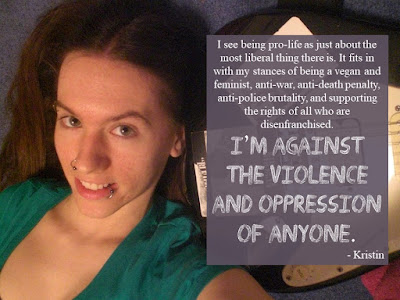
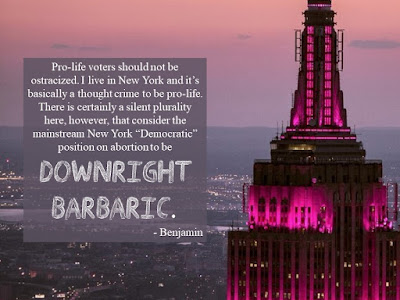
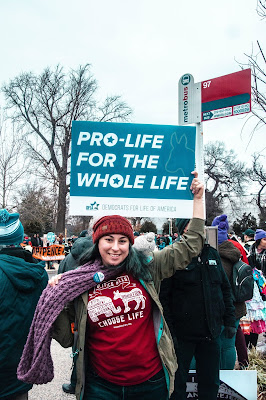
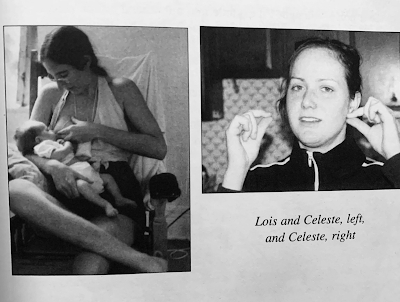
Leave a Reply
Want to join the discussion?Feel free to contribute!